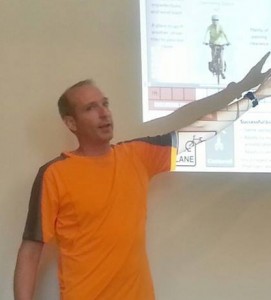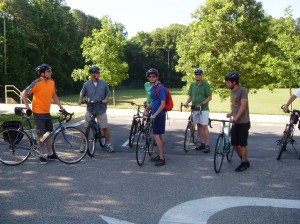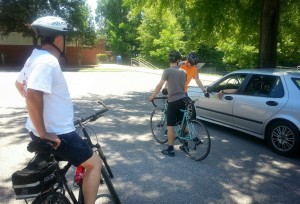Traffic Skills Clinic Description:
Oriented toward transportation engineers, planners, and police, but open to all adults, this intensive 9-hour on-bike training course teaches the fundamentals of safe, efficient, and lawful bicycle driving in urban traffic. Participants enhance their bike handling skills, increase their confidence in traffic, and improve their understanding of how state traffic laws support successful bicycling. Common bicyclist crash types are examined in the context of defensive bicycling practices. Implications for transportation planning, facility design, and law enforcement are discussed. Students receive certification for completing League of American Bicyclists Traffic Skills 101.
The Traffic Bicycling for Transportation Professionals course begins with first principles of bicycling kinematics and handling. Through on-bike exercises, students discover the full lateral operating space required for balance when scanning behind themselves and for avoiding surface and door zone hazards. Stopping distances and turning radii are experienced at speed. Next the basic rules of movement are presented as a consistent concept of operations for traffic negotiation. Students practice basic traffic maneuvers on local streets with minimal traffic. Statewide bicycling crash data, common failure modes, and effective defensive bicycling techniques are analyzed. Common road and traffic control features are examined to identify conflict points and avoidance strategies. At the end of the class, students demonstrate successful bicycle driving techniques on downtown streets in rush-hour traffic. Students leave the class with the skill to safely negotiate typical traffic situations by bicycle, and the operational insight required to evaluate bicycle facility and traffic control options.
Prerequisites:
Students must be physically capable of riding a bicycle approximately twelve miles at casual speeds, with multiple breaks for classroom sessions. Inexperienced cyclists are welcome and encouraged to attend. Students must bring their own bicycle in good working order, a helmet, water bottle, and clothing comfortable for bicycling.
Course Fee:
$50 advance registration. Proceeds go to BikeWalk NC.
About the Instructor:
Steven Goodridge has been an avid commuting and recreational bicyclist for 30 years and is a League of American Bicyclists certified Master Instructor. He developed the Bicyclist Safety and Law Enforcement in-service training program used by the Raleigh Police Department and the NC State University Police Department. Steven is a board member of BikeWalk NC and served on the Cary Planning and Zoning Board from 2000-2006.

Testimonials:
“This course is a good starting point for transportation design professionals to actually understand what it is they’re designing for. Once cannot deliver a product without understanding the needs of the customer.”
– Eric J. Lamb, PE, City of Raleigh Public Works Dept.
“As someone who has cycled for fun nearly all of my life, this class provided insight into utility cycling for transportation that has given me a new confidence to operate my bicycle as a vehicle. I particularly enjoyed the on-bike sessions and highly recommend this class to anyone interested in honing their cycling skills, learning about the rules of the road and experiencing on-road cycling the right way.”
– Juliet Andes
“I appreciated the focus on road safety in traffic conditions. The messages that are reinforced through classroom exercises as well as on-road segments are worthwhile for bicyclists at any skill level. I have been riding a bicycle since I was a kid, but only recently have become interested in knowing more about “driving” a bicycle as a responsible operator on public streets, which I have been doing for several years now in Raleigh, North Carolina. I learned in the class that, while I am experienced and not fearful in traffic, I have some bad habits that I need to break, and that even a fairly experienced on-road bicyclist can still learn a surprising amount about control and proper positioning on the street to improve my skills and increase my safety factor in different situations.”
– J. Scott Lane
Class Agenda (subject to change)
8:00-8:50 Classroom Session 1: Getting Started
- Introduction to objectives and concepts
- Bicycle equipment and fit
- Lighting and visibility
8:50-9:00 Break
9:00-11:10 On-Bike Session 1: Bike Handling (parking deck)
- ABC Quick Check
- Starting, stopping, shifting
- Looking back, signaling
- Emergency handling skills
11:10-11:20 Break
11:20-12:30 Classroom Session 2: Bicycle Driving Fundamentals
- Rules of the Road for Drivers
- Special Considerations for Bicyclists
12:30- 1:30 Ride to Lunch
1:30-2:45 On-Bike Session 2: On the Road (two-lane 25 mph roads)
2:45-3:00 Break
3:00-4:00 Classroom Session 3: Dealing with Challenges
- Crash data analysis, common crash types and causes
- Traffic hazards, surface hazards, obstacles
- Bike lanes and multi-use paths
- Traffic signal detectors
4:00 – 5:15 On-Bike Session 3: Traffic Cycling and On-Road Testing
(busier, faster and multi-lane roads, various lane widths, turn lanes)
5:15-5:30 Break
5:30-6:00 Classroom – Written Test, Graduation, Course Evaluations

